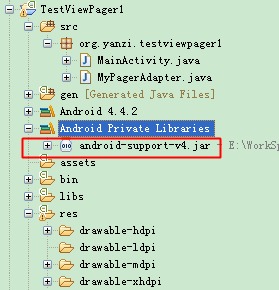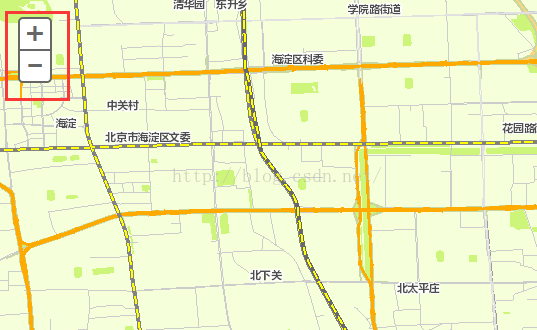android JNI是連接android Java部分和C/C++部分的紐帶,完整使用JNI需要Java代碼和C/C++代碼。其中C/C++代碼用於生成庫文件,Java代碼用於引用C /C++庫文件以及調用C/C++方法。
android Java部分代碼:
/*
* Copyright (C) 2008 The Android Open Source Project
*
* Licensed under the Apache License, Version 2.0 (the License);
* you may not use this file except in compliance with the License.
* You may obtain a copy of the License at
*
* http://www.apache.org/licenses/LICENSE-2.0
*
* Unless required by applicable law or agreed to in writing, software
* distributed under the License is distributed on an AS IS BASIS,
* WITHOUT WARRANTIES OR CONDITIONS OF ANY KIND, either express or implied.
* See the License for the specific language governing permissions and
* limitations under the License.
*/
package com.example.android.simplejni;
import android.app.Activity;
import android.os.Bundle;
import android.widget.TextView;
public class SimpleJNI extends Activity {
/** Called when the activity is first created. */
@Override
public void onCreate(Bundle savedInstanceState) {
super.onCreate(savedInstanceState);
TextView tv = new TextView(this);
// int sum = Native.add(2, 3);
int minus = Native.minus(10, 3);
tv.setText(10-3 = + Integer.toString(minus));
setContentView(tv);
}
}
class Native {
static {
// The runtime will add lib on the front and .o on the end of
// the name supplied to loadLibrary.
System.loadLibrary(simplejni);
}
static native int add(int a, int b);
static native int minus(int a, int b);
}
Java代碼說明: 1)SimpleJNI是一個activity的類對象,在該類對象中生成調用JNI函數的類對象,同時調用JNI方法,最後將JNI方法的結果顯示到標題欄上; 2)SimpleJNI是一個引用和聲明JNI庫和函數的類,其中System.loadLibrary();函數用來引用JNI庫,默認JNI庫放在 android系統的/system/lib/目錄下; static native int add(int a, int b);為聲明需要在java程序中使用的JNI庫中的函數; JNI中java部分的代碼到此就結束了,總結一下在java代碼中需要做兩件事: 1)使用System.loadLibrary()函數來引用JNI庫; 2)聲明調用JNI庫的函數且前面添加native關鍵字;
android C/C++部分代碼:
/*
* Copyright (C) 2008 The Android Open Source Project
*
* Licensed under the Apache License, Version 2.0 (the License);
* you may not use this file except in compliance with the License.
* You may obtain a copy of the License at
*
* http://www.apache.org/licenses/LICENSE-2.0
*
* Unless required by applicable law or agreed to in writing, software
* distributed under the License is distributed on an AS IS BASIS,
* WITHOUT WARRANTIES OR CONDITIONS OF ANY KIND, either express or implied.
* See the License for the specific language governing permissions and
* limitations under the License.
*/
#define LOG_TAG simplejni native.cpp
#include
#include
#include jni.h
static jint
add(JNIEnv *env, jobject thiz, jint a, jint b) {
int result = a + b;
ALOGI(%d + %d = %d, a, b, result);
return result;
}
static jint
minus(JNIEnv *env, jobject thiz, jint a, jint b) {
int result = a - b;
ALOGI(%d - %d = %d, a, b, result);
return result;
}
static const char *classPathName = com/example/android/simplejni/Native;
static JNINativeMethod methods[] = {
{add, (II)I, (void*)add },
{minus, (II)I, (void*)minus }
};
/*
* Register several native methods for one class.
*/
static int registerNativeMethods(JNIEnv* env, const char* className,
JNINativeMethod* gMethods, int numMethods)
{
jclass clazz;
clazz = env->FindClass(className);
if (clazz == NULL) {
ALOGE(Native registration unable to find class '%s', className);
return JNI_FALSE;
}
if (env->RegisterNatives(clazz, gMethods, numMethods) < 0) {
ALOGE(RegisterNatives failed for '%s', className);
return JNI_FALSE;
}
return JNI_TRUE;
}
/*
* Register native methods for all classes we know about.
*
* returns JNI_TRUE on success.
*/
static int registerNatives(JNIEnv* env)
{
if (!registerNativeMethods(env, classPathName,
methods, sizeof(methods) / sizeof(methods[0]))) {
return JNI_FALSE;
}
return JNI_TRUE;
}
// ----------------------------------------------------------------------------
/*
* This is called by the VM when the shared library is first loaded.
*/
typedef union {
JNIEnv* env;
void* venv;
} UnionJNIEnvToVoid;
jint JNI_OnLoad(JavaVM* vm, void* reserved)
{
UnionJNIEnvToVoid uenv;
uenv.venv = NULL;
jint result = -1;
JNIEnv* env = NULL;
ALOGI(JNI_OnLoad);
if (vm->GetEnv(&uenv.venv, JNI_VERSION_1_4) != JNI_OK) {
ALOGE(ERROR: GetEnv failed);
goto bail;
}
env = uenv.env;
if (registerNatives(env) != JNI_TRUE) {
ALOGE(ERROR: registerNatives failed);
goto bail;
}
result = JNI_VERSION_1_4;
bail:
return result;
}
JNI C/C++代碼說明: 1)JNI_OnLoad()函數。該函數在Java程序調用System.loadLibrary()時,被調用執行,用於向JavaVM注冊JNI函數等。在本例中首先通過參數JavaVM(Java虛擬機指針)獲取當前應用程序所在的線程,即:JNIEnv。再通過調用 android::AndroidRuntime::registerNativeMethods()注冊native實現的函數指針。 2)JNI函數和Java調用函數的映射關系。使用JNINativeMethod將java調用的函數名與JNI實現的函數名聯系在一起; 3)JNI函數實現; Android.mk代碼:
#
# Copyright (C) 2008 The Android Open Source Project
#
# Licensed under the Apache License, Version 2.0 (the License);
# you may not use this file except in compliance with the License.
# You may obtain a copy of the License at
#
# http://www.apache.org/licenses/LICENSE-2.0
#
# Unless required by applicable law or agreed to in writing, software
# distributed under the License is distributed on an AS IS BASIS,
# WITHOUT WARRANTIES OR CONDITIONS OF ANY KIND, either express or implied.
# See the License for the specific language governing permissions and
# limitations under the License.
#
# This makefile shows how to build a shared library and an activity that
# bundles the shared library and calls it using JNI.
TOP_LOCAL_PATH:= $(call my-dir)
# Build activity
LOCAL_PATH:= $(TOP_LOCAL_PATH)
include $(CLEAR_VARS)
LOCAL_MODULE_TAGS := samples
LOCAL_SRC_FILES := $(call all-subdir-java-files)
LOCAL_PACKAGE_NAME := SimpleJNI
LOCAL_JNI_SHARED_LIBRARIES := libsimplejni
LOCAL_PROGUARD_ENABLED := disabled
LOCAL_SDK_VERSION := current
include $(BUILD_PACKAGE)
# ============================================================
# Also build all of the sub-targets under this one: the shared library.
include $(call all-makefiles-under,$(LOCAL_PATH))
 Android中ViewPager的PagerTabStrip與PagerTitleStrip用法實例
Android中ViewPager的PagerTabStrip與PagerTitleStrip用法實例
 arcgis api for js共享干貨系列之二自定義Navigation控件樣式風格
arcgis api for js共享干貨系列之二自定義Navigation控件樣式風格
 Android四大組件之Service進階
Android四大組件之Service進階
 如何判斷軟件程序是否聯網 聯網狀態提示信息Android實現
如何判斷軟件程序是否聯網 聯網狀態提示信息Android實現